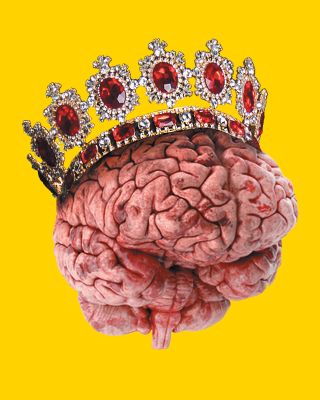Confidence
7 Research-Backed Benefits of Improv Comedy
Research shows that improv has numerous psychological benefits.
Posted April 1, 2023 Reviewed by Vanessa Lancaster
Key points
- Brain-scan studies have shown that improv activates creative brain centers and can help with brain connectivity.
- Psychological studies have shown that improv generally boosts creativity and confidence.
- Studies also show that improv generally decreases stress, anxiety, and uncertainty intolerance.

Sometimes I find myself preaching to the choir. I write about improv’s psychological benefits, and fellow improvisers often tell me that they’ve known these things long before they started cramming improv comedians into MRIs.
I hear something drastically different when my interviews or articles reach beyond improv comedians. People respond by saying that improv can’t possibly have psychological benefits because they went to an improv show once in college and weren’t into it or because the very thought of doing improv feels psychologically damaging to them.
So I thought it was time to list what research has shown about improv comedy so far. There are fMRI and EEG studies that show how improv alters the brain, as well as a fast-growing list of psychological studies measuring improv’s impact on creativity, stress, confidence, anxiety, uncertainty intolerance, and psychological well-being.
When I wrote the academic book Theatrical Improvisation, Consciousness, and Cognition in 2013, there were only a few improv studies. As you’re about to see, a decade later, we have a substantial body of research indicating how powerful improv can be as a therapeutic tool. Improv literally changes your mind, so if you’re one of the uninitiated, I hope this list of benefits changes your mind about improv.
1. Improv activates language and creativity centers in the brain.
Improv changes the brain. In a series of studies, Charles Limb and his team put jazz improvisers, freestyle rappers, and improv comedians into fMRI machines. Functional MRIs measure blood flow in the brain, giving us a better picture of which brain areas are more and less activated. Limb and team found that during improv, an area called the dorsolateral prefrontal cortex tends to be less active, and an area known as the medial prefrontal cortex becomes more active. This means that while improvising, a brain region associated with self-judgment “quiets down,” and a creative and language brain center “speaks up.” This inverse relationship is known as weak connectivity in the executive control network and is more generally linked with flow states and creativity.
2. Improv helps promote brain connectivity.
Improv also helps with brain wave coherence. In another study, Mary DeMichele and Scott Kuenneke placed qEEG electrodes on adolescents’ heads and measured their brain wave activity before and after 20 minutes of improv. They found that improv helped with brain wave coherence. Since trauma negatively affects coherence, they propose that improv could be a helpful treatment for people with complex trauma since it may help them connect better with others and help brain regions work better together.
3. Improv boosts creativity.
Improv helps with divergent thinking. There are many studies linking improv and enhanced divergent thinking. James Mourey led one study that examined how improv affected marketing students’ divergent thinking, collaboration, and self-efficacy. To test their divergent thinking, Mourey had participants devise as many uses for a paper clip as possible. This is a classic divergent thinking test. Mourey found that a ten-week improv course generally helped participants develop more creative uses for the paper clip compared to a control group.
4. Improv reduces social anxiety.
It may seem counterintuitive, but studies show that improv can reduce social anxiety. Peter Felsman has led two studies that measure how improv affected people’s reported social anxiety. He found that improv was generally helpful in lowering people’s social anxiety, even after just 20 minutes of an improv intervention.

5. Improv reduces uncertainty intolerance.
Uncertainty intolerance is the psychological gauge of how not-okay someone is with the unknown. Peter Felsman led a study that showed that, generally, improv helps reduce people’s uncertainty intolerance and that this decrease is linked with a decrease in social anxiety. In short, improv makes many people more comfortable with uncertainty, which makes them more likely to face social situations.
6. Improv boosts confidence.
Improv increases interpersonal and performance confidence. Sirke Seppänen measured student teachers’ confidence with questionnaires before and after improv interventions and found that, compared to a control group, improv increased people’s interpersonal confidence, which is the belief that one can interact with others successfully. Seppanen also found that performance confidence increased thanks to improv, and this boost persisted a year after the improv intervention. In general, people with lower confidence levels before the study saw the biggest increases in their confidence levels.
7. Improv decreases stress.
Improv has also been shown to decrease stress before a performance task. Seppänen led a study that compared participants’ stress levels before and after publicly answering a math question. They used questionnaires, saliva samples to test cortisol levels, and electrodes to measure stress levels. They found that the group who participated in a seven-week improv course were generally less stressed before the math task. Much like Sepannen’s findings with confidence, the participants with the lowest confidence levels reported the largest stress-mitigation effects.
Improv’s Psychological Benefits
In just one decade, researchers have done exciting research and begun to paint a more complete picture of improv’s benefits and how we can use it as a therapeutic treatment. Improv boosts creativity and confidence and decreases anxiety and uncertainty intolerance. In a world where we seem to be growing farther apart and becoming more anxious and divided, improv may be one way we can get out of our heads and work well with others.
References
Cox, P. (2018, May 24). This is your brain on improv. The World from PRX. Retrieved March 30, 2023, from https://theworld.org/stories/2018-05-23/your-brain-improv
DeMichele, M., & Kuenneke, S. (2021). Short-form, comedy improv affects the functional connectivity in the brain of adolescents with complex developmental trauma as measured by qEEG: A single group pilot study. NeuroRegulation, 8(1), 2-2.
Felsman, P., Seifert, C. M., & Himle, J. A. (2019). The use of improvisational theater training to reduce social anxiety in adolescents. The Arts in Psychotherapy, 63, 111-117.
Felsman, P., Seifert, C. M., Sinco, B., & Himle, J. A. (2023). Reducing social anxiety and intolerance of uncertainty in adolescents with improvisational theater. The Arts in Psychotherapy, 82, 101985.
Limb, C. J., & Braun, A. R. (2008). Neural substrates of spontaneous musical performance: An fMRI study of jazz improvisation. PLoS one, 3(2), e1679.
López-González, M., & Limb, C. J. (2012, January). Musical creativity and the brain. In Cerebrum: the dana forum on brain science (Vol. 2012). Dana Foundation.
Mourey, J. A. (2020). Improv comedy and modern marketing education: Exploring consequences for divergent thinking, self-efficacy, and collaboration. Journal of Marketing Education, 42(2), 134-148.
Seppänen, S., Tiippana, K., Jääskeläinen, I., & Toivanen, T. (2019). Theater improvisation promoting interpersonal confidence of student teachers: A controlled intervention study. The European Journal of Social & Behavioural Sciences.
Seppänen, S. (2022). ‘What would happen if I said “Yes”?’: Measuring the immediate and long-term impact of improvisation training on student teachers’ subjective, neuroendocrine and psychophysiological responses.




